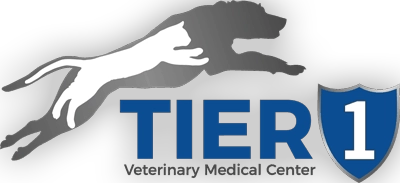Kennel cough, also known as Canine Infectious Respiratory Disease Complex (CIRDC), is a highly contagious respiratory condition that affects dogs of all breeds and ages. If your dog has ever developed a persistent, dry, hacking cough after spending time at a kennel, dog park, or boarding facility, they might have encountered this condition. But what exactly is kennel cough, and how can you protect your furry friend?
In this blog, we’ll explore the causes, symptoms, treatments, and preventive measures for kennel cough, with expert insights from Dr. Sean McPeck of Tier 1 Vet.
What is Kennel Cough?
Kennel cough is a term used to describe respiratory infections in dogs caused by a mix of bacteria and viruses. It can result from Bordetella bronchiseptica, canine influenza, parainfluenza, or a combination of these pathogens. The condition is often contracted in environments where dogs are in close quarters, such as kennels, boarding facilities, or doggy daycares.
How Does Kennel Cough Spread?
Kennel cough spreads through direct contact between dogs or via respiratory droplets in poorly ventilated areas. It’s highly contagious, especially in crowded spaces where dogs share the same air, water bowls, or toys. While the Bordetella vaccine can reduce your dog’s risk, it doesn’t protect against every strain, making awareness and early intervention essential.
Symptoms of Kennel Cough
The hallmark symptom of kennel cough is a persistent, dry, hacking cough, often described as sounding like a “goose honk.” Other symptoms may include:
- Sneezing or nasal discharge
- Mild lethargy
- Loss of appetite
- Low-grade fever
Symptoms typically appear within a few days of exposure. Left untreated, kennel cough can lead to serious complications like pneumonia or respiratory distress.
How is Kennel Cough Treated?
Treating kennel cough involves addressing the symptoms and preventing the condition from worsening. Dr. Sean McPeck explains that the goals of treatment include:
- Suppressing Coughing: Reducing airway irritation helps break the cycle of coughing and inflammation.
- Reducing Inflammation: Anti-inflammatory medications, such as corticosteroids, may be prescribed to soothe irritated airways.
- Targeting the Infection: Broad-spectrum antibiotics treat bacterial infections effectively, even if the exact pathogen isn’t identified.
When to Seek Veterinary Care
If your dog develops a cough after being around other dogs, consult your veterinarian. Early intervention prevents the condition from escalating and reduces treatment costs. Mild cases might require oral antibiotics and cough suppressants, while severe cases could need oxygen support or hospitalization.
How Long Does Recovery Take?
Recovery times vary based on infection severity and how quickly treatment begins.
- Mild Cases: Most dogs recover within 5–7 days, though antibiotics may be prescribed for a longer period to ensure complete resolution.
- Severe Cases: Recovery can take weeks, especially if complications like pneumonia develop.
Always complete the full course of medication prescribed by your veterinarian, even if your dog seems better before finishing it.
Preventing Kennel Cough
While it’s impossible to eliminate all risks, you can take steps to minimize your dog’s exposure:
1. Vaccinate Your Dog
The Bordetella vaccine significantly reduces the likelihood and severity of infection. While not 100% effective, it’s a critical preventive measure, particularly for dogs visiting kennels or dog parks.
2. Choose Boarding Facilities Wisely
Select kennels or daycare centers with good ventilation, regular cleaning, and limited overcrowding. Ask about their policies on preventing contagious illnesses.
3. Practice Good Hygiene
Avoid sharing toys, bowls, or leashes with other dogs in public spaces.
4. Monitor Social Interactions
Limit your dog’s exposure to sick dogs or high-risk environments, especially if your dog is very young, older, or has a weakened immune system.
Why Vaccination is Still Important
One common question pet owners ask is: If the Bordetella vaccine isn’t 100% effective, why bother? While it doesn’t cover every strain, the vaccine reduces the risk of infection and severity of symptoms. Most boarding facilities require it as a precautionary measure, making it an essential part of your pet’s health routine.
When to Contact Your Veterinarian
If your dog shows signs of kennel cough—especially after being in close proximity to other dogs—seek veterinary care immediately. Early intervention can prevent complications, reduce treatment costs, and help your dog recover faster.
At Tier 1 Vet, we specialize in diagnosing and treating respiratory conditions like kennel cough. From vaccines to tailored treatment plans, we’re here to support your pet’s health.
Frequently Asked Questions About Kennel Cough
Q: Can my dog still get kennel cough if they’ve been vaccinated?
A: Yes, but the vaccine significantly reduces the risk and severity of infection.
Q: What should I do if my dog has kennel cough?
A: Isolate your dog, consult your veterinarian, and follow their treatment recommendations.
Q: Can kennel cough resolve on its own?
A: Mild cases might resolve without treatment, but delaying care can lead to complications. Always consult your vet if symptoms appear.
Why Choose Tier 1 Vet?
At Tier 1 Vet, we understand how important your pet’s health is. As Alaska’s premier veterinary hospital, we provide:
- Vaccinations to protect your pet
- Expert diagnosis and treatment of respiratory conditions
- Compassionate care and support for you and your pet
We’re open 365 days a year to ensure your pet gets the care they need when they need it.
📍 Contact Us:
🌐 tier1vet.com
📞 907-745-8437
Protect Your Pet Today
Kennel cough may be common, but it’s also preventable and treatable. By vaccinating your dog, monitoring their health, and choosing high-quality boarding facilities, you can reduce the risks significantly.
